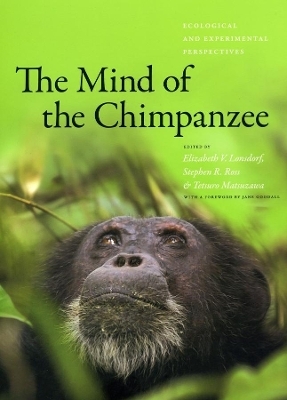
The Mind of the Chimpanzee
Ecological and Experimental Perspectives
Seiten
2010
University of Chicago Press (Verlag)
978-0-226-49279-7 (ISBN)
University of Chicago Press (Verlag)
978-0-226-49279-7 (ISBN)
Understanding the chimpanzee mind is akin to opening a window onto human consciousness. Many of our complex cognitive processes have origins that can be seen in the way that chimpanzees think, learn, and behave. This title brings together scientists from around the world to share the research into what goes on inside the mind of the chimpanzee.
Understanding the chimpanzee mind is akin to opening a window onto human consciousness. Many of our complex cognitive processes have origins that can be seen in the way that chimpanzees think, learn, and behave. "The Mind of the Chimpanzee" brings together scores of prominent scientists from around the world to share the most recent research into what goes on inside the mind of our closest living relative. Intertwining a range of topics - including imitation, tool use, face recognition, culture, cooperation, and reconciliation - with critical commentaries on conservation and welfare, the collection aims to understand how chimpanzees learn, think, and feel, so that researchers can not only gain insight into the origins of human cognition, but also crystallize collective efforts to protect wild chimpanzee populations and ensure appropriate care in captive settings. With a breadth of material on cognition and culture from the lab and the field, "The Mind of the Chimpanzee" is a first-rate synthesis of contemporary studies of these fascinating mammals that will appeal to all those interested in animal minds and what we can learn from them.
Understanding the chimpanzee mind is akin to opening a window onto human consciousness. Many of our complex cognitive processes have origins that can be seen in the way that chimpanzees think, learn, and behave. "The Mind of the Chimpanzee" brings together scores of prominent scientists from around the world to share the most recent research into what goes on inside the mind of our closest living relative. Intertwining a range of topics - including imitation, tool use, face recognition, culture, cooperation, and reconciliation - with critical commentaries on conservation and welfare, the collection aims to understand how chimpanzees learn, think, and feel, so that researchers can not only gain insight into the origins of human cognition, but also crystallize collective efforts to protect wild chimpanzee populations and ensure appropriate care in captive settings. With a breadth of material on cognition and culture from the lab and the field, "The Mind of the Chimpanzee" is a first-rate synthesis of contemporary studies of these fascinating mammals that will appeal to all those interested in animal minds and what we can learn from them.
Elizabeth V. Lonsdorf is the director of the Lester E. Fisher Center for the Study and Conservation of Apes at the Lincoln Park Zoo in Chicago and a faculty member of the Committee on Evolutionary Biology at the University of Chicago. Stephen R. Ross supervises behavior and cognitive research at the Fisher Center and chairs the Chimpanzee Species Survival Plan of the Association of Zoos and Aquariums. Tetsuro Matsuzawa directs the Primate Research Institute at Kyoto University.
| Erscheint lt. Verlag | 24.9.2010 |
|---|---|
| Vorwort | Jane Goodall |
| Sprache | englisch |
| Maße | 22 x 28 mm |
| Gewicht | 879 g |
| Themenwelt | Naturwissenschaften ► Biologie ► Zoologie |
| ISBN-10 | 0-226-49279-6 / 0226492796 |
| ISBN-13 | 978-0-226-49279-7 / 9780226492797 |
| Zustand | Neuware |
| Haben Sie eine Frage zum Produkt? |
Mehr entdecken
aus dem Bereich
aus dem Bereich


